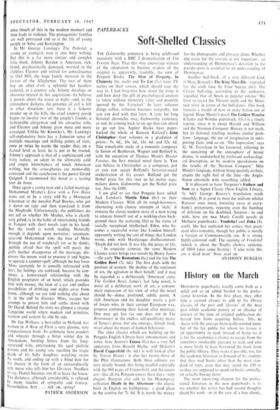Soft-Shelled Classics
PAPERBACKS THE Galsworthy centenary is being celebrated massively with a BBC 2 dramatisation of The Forsyte Saga. That this may encourage viewers
of the adaptation to become readers of the original is, apparently, laudably, the view of Penguin Books. The Man of Property, In Chancery (6s. each) and To Let (5s.) have TV scenes on their covers, which should case the way in. I had forgotten how sharp the irony is and how deep 'the gift of psychological analysis (a talent without monetary value and properly ignored by the Forsytes).' In later volumes things soften, criticism becomes sympathy, but you can deal with that later. A taste for long fictional chronicles may, Galsworthy centenary or not, be coming back to an age that can afford to go out less. Jupiter Books have paper- backed the whole of Romain Rolland's John Christopher—four volumes in a gradation of prices : 5s. 6d., 10s. 6d., 1 ls. 6d. and 12s. 6d.
This remarkable study of a romantic composer
(a fusion of Beethoven, Wagner and Berlioz) is, with the exception of Thomas Mann's Doctor Faustus, the best musical novel there is. You can believe in Christopher as a composer, just as you can accept Rolland's historico-social orchestration of his career. Rolland got the Nobel prize for this (not to let native saga- makers down, Galsworthy got the Nobel prize too. Also the OM).
I am glad to see that Penguin have added Jack London's Martin Eden (6s.) to their Modern Classics. With all its rough-hewnness, alternating with clumsy attempts at `style,' it remains the classic modern story of a man trying to educate himself out of a working-class back- ground (here the seafaring life) to the status of socially recognised intellectual. Eden, who be- comes a successful writer like London himself, apparently writing the sort of things that London wrote, ends with Hardyesque disillusionment. `Death did not hurt. It was life, the pangs of life.
. . In exquisite contrast, the same Modern Classics series brings two novels by Henry James —the early The Bostonians (6s.) and the late The Golden Bowl (7s. 6d.). The first deals with the position of women, 'the decline of the sentiment of sex, the agitation in their behalf,' and it may be regarded as a deliberately 'American' story. The Golden Bowl, James's last long novel, is more of a deliberate work of art, a consum- mate expression of his view of what the novel should be—dense, profound, subtle, poetic. A rich American and his daughter marry a pair of lovers who, in their corrupt European way, propose continuing their liaison after marriage. One may get lost (as one does not in The Bostonians) in the endless self-qualifying mazes of James's prose, but one emerges, though tired, wiser about the mazes of human behaviour.
The older classics which are building up the Penguin English Library have introductions and notes. Jane Austen's Emma (6s.) has a very full apparatus from Ronald Blythe, and Dickens's David Copperfield (8s. 6d.) is well looked after by Trevor Blount : it also has twenty-three of the Phiz illustrations. Both these editions are very stoutly bound, this being needful especially with the 960 pages of Copperfield, and the covers are—like all the Penguin covers these days—very elegant. Penguin also add to the Hemingway collection Death in the Afternoon—the classic book in English on bullfighting : a good place in the sombra for 7s. 6d. It is worth the money for the photographs and glossary alone. Whether one cares for the corrida is not important: an understanding of Hemingway's devotion to the pseudo-sport is essential to an understanding of Hemingway.
Another bull-book, of a very different kind, is Mary Renault's The King Must Die—reprinted for the sixth time by Four Square (6s.). The Cretan bull-ring, according to the authoress, 'equalled that of Spain in popular esteem.' We have to recast the Theseus myth and the Mino- taur story in terms of the bull-dance. This book remains a model of how to make fiction out of legend. Hope Muntz's novel The Golden Warrior (Chatto and Windus paperback, 15s.) is a timely reprint, since it is about Harold and William and the Norman Conquest. History is not myth, but its fictional retelling involves similar prob- lems—language, the use of imagination in inter- preting facts, and so on. 'The impression,' says G. M. Trevelyan in his foreword, referring to the sustaining of the atmosphere of heroic drama, is undisturbed by irrelevant archaeologi- cal description, or by modern speculations on the results of the Norman Conquest.' Miss Muntz's language, without being quaintly archaic, attains the right feel of the time—the Anglo- Saxon chronicle with something added.
It is pleasant to have Turgenev's Fathers and Sons as a Signet Classic (New English Library, 3s. 6d.). George Reavey's translation reads smoothly. It is good to meet the militant nihilist Bazarov once more, knouting away at every- body's pretensions, rejecting even the humbug of delirium on his deathbed. Surprise : to end with, here are two Marie Corelli novels in Methuen paperbacks : Vendetta! and Ziska (5s. each). She has outlasted her critics, that great- eyed ultra-romantic, though her public is mostly a foreign or Commonwealth one. It is strong highly-coloured stuff. The opening of Vendetta! (which is about the Naples cholera epidemic of 1884) takes some beating: 'I who write this am a dead man.' Now read on.
ANTHONY BURGESS


































 Previous page
Previous page